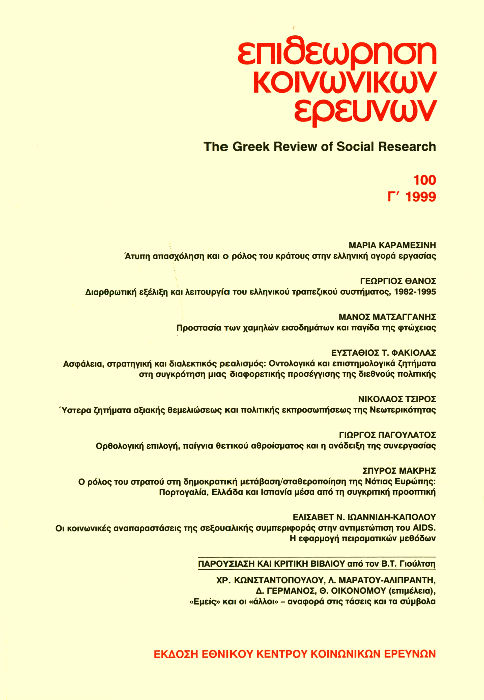Προστασία των χαμηλών εισοδημάτων και παγίδα της φτώχειας
Abstract
Μία ευρεία συναίνεση δείχνει να διαμορφώνεται μεταξύ αναλυτών δημόσιας
πολιτικής και ληπτών αποφάσεων υπέρ της θεσμοθέτησης εισοδηματικών προϋποθέσεων για τη χορήγηση κοινωνικών παροχών. Η παρούσα μελέτη επιχειρεί να στοιχειοθετήσει μια κριτική επιφύλαξη στη συναίνεση αυτή υπενθυμίζοντας τα αντικίνητρα που εισάγουν οι επιλεκτικές παροχές. Ιδιαίτερη έμφαση δίνεται στο πρόβλημα της παγίδας της φτώχειας που προκαλείται από μια τυπική επιλεκτική παροχή: το ελάχιστο εγγυημένο εισόδημα. Η μελέτη καταλήγει στο συμπέρασμα ότι η θεσμοθέτηση εισοδηματικών προϋποθέσεων, αν και στοχεύει στην εξοικονόμηση πόρων και στη βελτίωση της αναδιανεμητικής
επίπτωσης των κοινωνικών παροχών, κινδυνεύει να προκαλέσει απώλειες ευημερίας με μείωση της οικονομικής αποδοτικότητας και χαλάρωση της κοινωνικής δικαιοσύνης.
Article Details
- How to Cite
-
Ματσαγγάνης Μ. (1999). Προστασία των χαμηλών εισοδημάτων και παγίδα της φτώχειας. The Greek Review of Social Research, 100, 65–78. https://doi.org/10.12681/grsr.752
- Issue
- 1999: 100, Γ'
- Section
- Articles

This work is licensed under a Creative Commons Attribution-NonCommercial 4.0 International License.
Authors who publish with this journal agree to the following terms:
- Authors retain copyright and grant the journal right of first publication with the work simultaneously licensed under a Creative Commons Attribution Non-Commercial License that allows others to share the work with an acknowledgement of the work's authorship and initial publication in this journal.
- Authors are able to enter into separate, additional contractual arrangements for the non-exclusive distribution of the journal's published version of the work (e.g. post it to an institutional repository or publish it in a book), with an acknowledgement of its initial publication in this journal.
- Authors are permitted and encouraged to post their work online (preferably in institutional repositories or on their website) prior to and during the submission process, as it can lead to productive exchanges, as well as earlier and greater citation of published work (See The Effect of Open Access).



